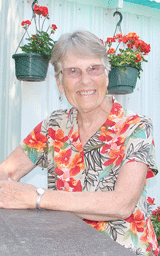July 22, 2010 at 8:20 a.m.
Public invited to open house for retiring long-time community caregiver
Lois Anderson, who embarked on her nursing career as Chisago county's only public health nurse in 1956, is retiring. There's a celebration for friends, co-workers and the general public July 28 in Chisago City.
At 78-years-of-age, she says of retiring, "It's about time, don't you think."
Anderson came to Chisago County fresh out of nursing school in St. Paul, where she also grew up. She rented a small house in Lindstrom and learned the ropes with help from the local health board, which hired her. She fondly recalls being "taken under their wing," and even though it was basically just Lois in the entire department, it felt like the right decision.
The move here also made it possible to meet her husband. Lois and "Poik" (Lindstrom barber) were married in 1961.
Lois worked for six years as county public health nurse, long before the federal Medicare program was created. Global Positioning System devices and cell phones hadn't been invented to help her travel in unfamiliar territory. People at the local post offices could be quite helpful, however, in directing her to where she needed to visit.
There are now 15 county public health nurses and numerous programs for populations in need of various levels of care to keep track of; and yet certain aspects of the job remain unchanged.
Being able to tune into what people want and need, for instance, is just as important now as when Lois was visiting a frail farmer or a schoolchild fighting a strange illness. There was, and still is, a line you don't cross when you are in someone's home, there are boundaries you respect, she adds.
Lois understood 40 years ago that the infirm just do better, healthwise, in their own homes. "There are things there at home that are more conducive to health," she explains, "...the familiar view out their own window, the dog, their family members."
Something took hold during her public health nursing years which later served as the foundation for her lengthy nursing career, and even though Lois would leave the county position to raise a son and daughter, and be a wife and homemaker, she would find herself again in people's homes, working for Fairview in its Hospice program.
She retires from Fairview with 15 years as a hospice nurse and about 30 years overall.
Lois has been gradually disengaging from the strenuous schedule of providing hospice services. About a year ago she got off the Hospice on-call nurse roster, but she has handled dozens of holiday and 2 a.m. emergency calls.
This is one piece of advice she is quick to share-- don't wait until the person is "in crisis." Contact hospice early on, and give the hospice team an opportunity to develop a relationship. The nurses are authorized to adjust medications and respond appropriately to manage pain, she continued, but this goes more smoothly when they have a rapport with the person they are caring for. It is important to the process that the caregivers are trusted and they have an understanding of the dynamics affecting every dying person's situation.
Lois said Poik would often ask as she returned home, 'Was it a good death?"
A good death is what every Hospice professional strives for. It means the patient is comfortable, they have time to say what they need to say, and it isn't such a struggle to loosen the knots holding them to their physical being. Lois says she certainly learned about death over all those years, but she also learned valuable lessons about living.
"I was concerned I would get depressed," working in the Hospice setting, she offered. "But it was just the opposite. I was able to do something, I was not standing by helplessly. And, you see such heroic things people do."
She has story after story. No names or identifying information is shared because Hospice is a confidential relationship...but, there was the ex-wife who split with a husband years before, but who stood by his side in Hospice and others. Many people who were brave, involved, helpful and thankful, and they all left a positive impression on Lois, she states.
Hospice care is reserved for patients who are in decline, they no longer are being treated and have a relatively short timeframe to live.
The Hospice credo is to shift the focus from treatment to comfort.
Lois smiles when told it must take a special kind of person to work around death day in and day out. She thinks anybody who does any job well, is a special kind of person. There's a uniqueness in all of us that when it's used the way it's meant to, it just works, she offers.
Was there one point in time when she remembers deciding to become a nurse?
Lois said she had a weird moment while rummaging in her scrapbooks and photos a while back, and she found a sixth grade school assignment she'd saved. She had utterly forgotten that in this primary school "career book" she'd written that she wanted to be a nurse when she grew up.




Comments:
Commenting has been disabled for this item.